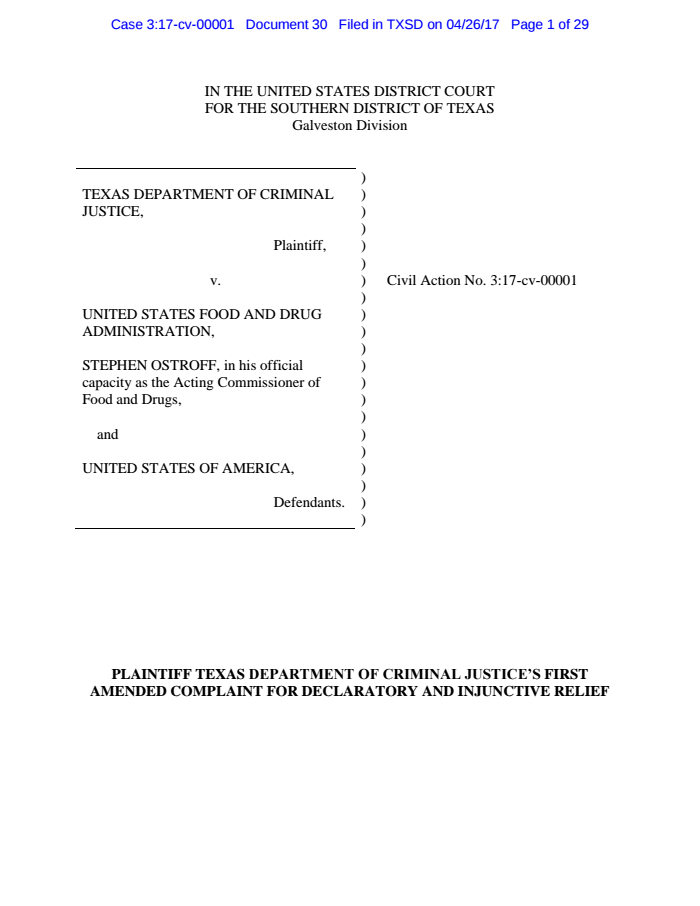
On Wednesday, Texas followed through on a promise to sue the federal government in an attempt to obtain lethal injection drugs the Food and Drug Administration maintains are illegal.
The Wednesday court filing sets up the unusual scenario of Texas suing the Trump administration for hindering the death penalty — a new complaint in a lawsuit originally brought against the Obama administration.
Texas, Arizona and Nebraska each purchased 1,000 vials of execution drugs from a man in India in 2015. Last week, the FDA formally denied the shipments, ruling that it's illegal to import the drug.
On Wednesday, the state filed an amended complaint in federal court, alleging that the FDA is harming the state by blocking the drugs.
"TDCJ has previously purchased and used thiopental sodium in numerous executions before" the sole FDA-approved supplier stopped making the drug, the state's lawyers wrote. "Through the import at issue in this case, TDCJ is attempting once again to utilize thiopental sodium for purposes of imposing lawful capital sentences."
The FDA blocking the shipments "directly harms TDCJ by preventing TDCJ from having the option of using the drugs at issue in lawful executions," the lawyers wrote. "This harm will continue unless and until the Court" forces the FDA to allow the drugs into the country.
In addition to state government lawyers from Attorney General Ken Paxton’s office, the state has hired outside lawyers from the law firm Alston & Bird to help represent the state. Wednesday’s filing was signed by Daniel G. Jarcho, a partner in the firm’s DC office who used to represent the FDA when he worked for the Justice Department.
Last week, the FDA sent Texas and Arizona a 26-page letter denying the drugs, arguing that they are unapproved, mislabeled, and that the government is legally bound by a 2012 court order issued by the federal district court in DC that prohibits them from allowing thiopental into the country.
In Texas' complaint filed Wednesday, the state makes no mention of the 2012 court order, which was upheld by a federal appeals court in DC, although it does note that the FDA's position on thiopental changed that year. Instead, the state focuses on arguing that it is exempt from the FDA's requirements because the drugs would be used for "law enforcement."
The state points to a statute that exempts drugs “shipped or sold to . . . persons . . . engaged in law enforcement, . . . and [are] to be used only for such . . . law enforcement.”
"Use of thiopental sodium to administer lawfully-imposed capital sentences through lethal injection is a use of the drug for law enforcement purposes," the state argues. "TDCJ is a state agency that is regularly and lawfully engaged in law enforcement."
The FDA declined to comment on the case. But in the letter the agency sent last week, the federal government wrote that the law enforcement exemption does not apply when the drugs are to be used on humans. The FDA also pointed out that the exemption was written before lethal injection was created.
"As an initial matter," the FDA noted, "the law enforcement exemption could not have been intended to apply to lethal injection, because FDA issued the regulation adding the exemption ... in 1956, well before any State used lethal injection as a method of execution."
Texas is asking the court to force the FDA to allow the drugs in, and to prohibit the FDA from detaining any future shipments of execution drugs it buys. Judge George Hanks set a telephone hearing for Thursday to discuss the status of the case.
In its complaint, Texas does not name the supplier of the drugs at issue, referring to it only as a "foreign distributor."
In 2015, Texas first planned on buying sodium thiopental from a small company in India, according to documents obtained by BuzzFeed News. That sale, however, fell through when the would-be supplier was raided by India's Narcotics Control Bureau, its employees arrested, its drugs seized, and its facility shut down. Indian law enforcement seized a massive amount of generic versions of Xanax, Ritalin, Ambien, Viagra, and various opioids.
When that deal fell through, Texas instead turned to a man in India named Chris Harris. Harris sold 3,000 vials of sodium thiopental to Texas, Arizona, and Nebraska for more than $75,000 — promising that there would be no legal problems with the sale.
Before the drugs were shipped, the FDA and DEA warned the states and Harris that the sale would be illegal and that the government would have to stop the shipment. The states bought the drugs anyway.
In its court filing Wednesday, Texas lamented that the FDA was harming its reputation by stopping the shipment.
By ruling the drugs illegal, "FDA has formally decided that TDCJ — a law
enforcement agency — has attempted to import drugs in violation of federal law," the lawyers wrote. "The refusal order has caused, and is substantially likely to continue to cause, adverse publicity that has and will injure TDCJ’s reputation by asserting that TDCJ has attempted to import drugs in violation of federal law."

